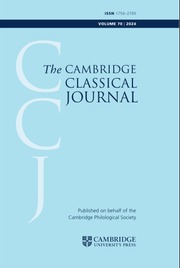Article contents
SOME FRESH AIR INTO THE NEOPYTHAGOREAN TRADITION: THE FRAGMENTS FROM ON KINGSHIP BY DIOTOGENES
Published online by Cambridge University Press: 05 February 2020
Abstract
The Neopythagorean Diotogenes, author of a lost treatise On Kingship of which some fragments have come down to us in Stobaeus’ Anthology, is a largely neglected writer. Scholars either ignore him or briefly discuss him in the context of general overviews of Greek political thinking, usually comparing him to other Neopythagoreans such as Sthenidas and Ecphantus. This article argues that Diotogenes deserves to be read for his own sake, as a creative and subtle thinker who managed to contribute to his own philosophical tradition by benefiting from Homeric exegesis and by taking into account the more concrete demands of daily life.
- Type
- Research Article
- Information
- Copyright
- Copyright © The Author(s) 2020. Published by Cambridge University Press
Footnotes
I am much indebted to all the participants in the different Journées d’étude devoted to the Neopythagorean treatises On Kingship in Paris, and to Myrto Hatzimichali and to the anonymous referees of this journal, whose comments on an earlier draft of this article helped me a lot in clarifying my position.
References
Works cited
- 1
- Cited by


